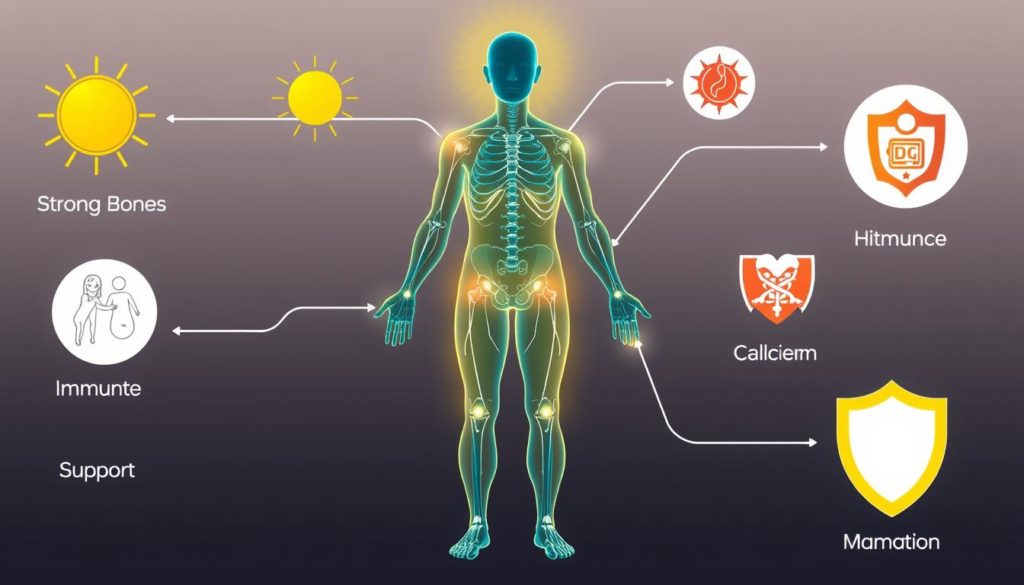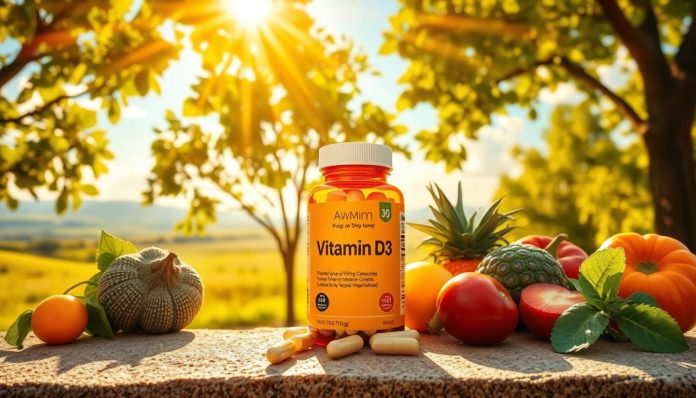Discover the many Vitamin D3 health benefits and see why it’s so important for your health. Known as the “sunshine vitamin,” Vitamin D3 is key. It helps keep bones strong and boosts your energy.
This important nutrient affects many parts of our body. It’s a big part of keeping us healthy.
We’ll look at how Vitamin D3 works in our bodies. It helps our immune system and keeps our bones strong. Learning about Vitamin D3 can improve our lives.
We’ll talk about natural sources and supplements. You’ll learn how to get the right amount of Vitamin D3.
Understanding Vitamin D3 and Its Crucial Role in Your Body
Vitamin D3 is found in sunlight and is vital for many body functions. It’s known for its role in bone health. But it also affects muscles and nerves, and helps control calcium levels.
The importance of Vitamin D3 goes beyond bones. It helps muscles and nerves work right. It also boosts the immune system, helping fight off sickness.

| Function | Description |
|---|---|
| Bone Health | Vitamin D3 helps bones grow strong by absorbing calcium. |
| Muscle Function | It’s key for muscle movement and keeping us stable. |
| Immune System | It makes immune cells work better to fight off sickness. |
| Cardiovascular Health | Vitamin D3 helps keep blood pressure in check, good for the heart. |
| Mental Agility | It’s linked to better mood and brain function. |
The crucial role of Vitamin D3 is huge. It keeps the body balanced. It helps with minerals, muscles, and the immune system. Vitamin D3 is key for health and wellness.
Vitamin D3 Health Benefits: Beyond Bone Health
Vitamin D3 is key for strong bones, but it does more. It helps muscles work better, keeps the heart healthy, and boosts mood. Let’s see how Vitamin D3 helps in these areas.
The Link Between Vitamin D3 and Muscle Function
Vitamin D3 is important for muscles. It helps them absorb calcium, which is needed for muscle movement. Without enough Vitamin D3, muscles can weaken, making falls more likely, mainly in older adults. Keeping Vitamin D3 levels right helps muscles stay strong and keeps us stable.
Cardiovascular Perks of Adequate Vitamin D3
Vitamin D3 is good for the heart. It can help control blood pressure. Studies show that enough Vitamin D3 lowers the risk of high blood pressure, which can lead to heart problems. Vitamin D3 helps the heart and can increase life expectancy.
Mental Health and Mood Regulation Through Vitamin D3
Vitamin D3 is also good for the mind. It can help with depression and anxiety. It works with neurotransmitters and protects brain cells. Having enough Vitamin D3 is important for good mental health.

Eating right, getting enough sunlight, and taking supplements can help. Knowing how Vitamin D3 works is important. It helps us understand why it’s so vital for our health.
Identifying and Combating Vitamin D3 Deficiency
To fight Vitamin D3 deficiency, first spot the early signs of Vitamin D3 deficiency. This step helps avoid Vitamin D3 deficiency risks and guides how to act. Look out for fatigue, bone pain, muscle weakness, and mood swings as signs.
Some groups face a higher risk, like older adults, those who don’t get much sun, and people with certain health issues. Knowing these risks helps in taking the right steps to prevent them.
- Adequate exposure to sunlight
- Inclusion of Vitamin D-rich foods in the diet
- Regular monitoring of Vitamin D levels
Acting fast against Vitamin D3 deficiency can stop serious problems like osteoporosis and heart disease. If you can’t get enough from food and sun, taking Vitamin D supplements is key. Here’s a look at Vitamin D levels for different groups:
| Risk Group | Recommended Vitamin D Level (IU/day) |
|---|---|
| Adults (19-70 years) | 600-800 |
| Adults (>70 years) | 800-1000 |
| Individuals with limited sun exposure | 800-1000 |
| Individuals with chronic conditions | Consult healthcare provider |
In short, being proactive in fighting Vitamin D3 deficiency and watching for signs of Vitamin D3 deficiency is key. It keeps you healthy and stops long-term Vitamin D3 deficiency risks.
The Sunlight Connection: Natural Vitamin D3 Sources
Looking into natural Vitamin D3 sources shows how key sunlight is. Our skin turns solar rays into Vitamin D3. Knowing this helps us stay healthy naturally.
Maximizing Outdoor Exposure for Vitamin D3 Synthesis
For Vitamin D3 to form, skin needs direct sun. Spend 10 to 15 minutes in the midday sun a few times a week. This depends on your skin, where you live, and the UV index.
Seasonal Affects on Vitamin D3 Production in the Skin
Seasons change how much Vitamin D3 we make. In winter, the sun’s rays are too weak for enough Vitamin D3. So, we need to adjust our sun time with the seasons.
Using natural Vitamin D3 sources is key for health. As seasons change, knowing how to manage Vitamin D3 through sunlight is important.
| Season | Sunlight Intensity | Recommended Exposure Time |
|---|---|---|
| Spring/Summer | High | 10-15 minutes |
| Fall/Winter | Low | 20-30 minutes |
| Year-round (equatorial regions) | Moderate to High | 5-10 minutes |
The Significance of Vitamin D3 for Immune Function
Looking into Vitamin D3 and immunity shows how this nutrient boosts our body’s defense. Vitamin D3 is key for bone health but also affects the immune system. It may help us fight off infections and lessen autoimmune disease symptoms.
Studies link immune function and Vitamin D3 closely. It activates important peptides in the immune system that fight infections. These peptides can greatly reduce infections by stopping viruses and bacteria from spreading.
- Vitamin D3 stimulates the production of infection-fighting proteins.
- It enhances immune cell responsiveness, making the immune system stronger against pathogens.
- Reduces inflammatory responses, which can cause chronic health problems if not controlled.
The Vitamin D3 perks for immunity are real. Enough Vitamin D3 lowers the risk of several immune-related conditions, like the flu and multiple sclerosis. In the darker months or where sunlight is scarce, keeping Vitamin D3 levels up is vital for immune health.
Adding enough Vitamin D3 to your diet or taking supplements can greatly improve immune health. This not only helps protect against infections but also boosts overall health and well-being.
Vitamin D3 Supplements: When Diet and Sunlight Aren’t Enough
Even with a healthy diet and plenty of sunlight, sometimes we don’t get enough Vitamin D3. In these cases, Vitamin D3 supplements are vital for our health.
Choosing the Right Vitamin D3 Supplement
Finding the right Vitamin D3 supplement is key. There are many types, each suited for different needs. Look for ones that have been tested for quality and strength.
Checking labels and certifications is important. It ensures the supplements are safe and effective. The right choice can greatly improve your Vitamin D3 levels.
Navigating the Market: Vitamin D3 Supplement Varieties
The variety of Vitamin D3 supplement types can be confusing. But knowing the basics can help you decide. Here are the main types:
- Softgels: Easy to take and well absorbed.
- Liquid Drops: Great for those who need to control doses or can’t swallow pills.
- Chewables: Good for kids and adults who find pills hard to swallow.
- Tablets: Often the cheapest option and good for long-term storage.
Each type has its own advantages. Your choice should depend on your personal needs and lifestyle.
In summary, Vitamin D3 supplements are a good solution when we can’t get enough from diet and sun. By choosing the right supplement and form, you can boost your health and well-being.
Optimizing Vitamin D3 Absorption: Tips and Tricks
To optimize Vitamin D3 absorption, making some simple changes is key. These absorption tips for Vitamin D3 can help you get the most from this important nutrient.
- Fat-Soluble Vitamin Synergy: Vitamin D3 works best with fats. Add healthy fats like avocado, nuts, seeds, and olive oil to your meals.
- Magnesium-Rich Foods: Magnesium helps activate vitamin D. Eating foods rich in magnesium, like leafy greens and whole grains, is beneficial.
- Proper Supplement Timing: Taking vitamin D supplements with your biggest meal can boost absorption by up to 50%.
- Regular Sunlight Exposure: Sunlight triggers vitamin D production in your skin. Spend 10-30 minutes in the sun during the day, a few times a week.
Co-factors play a big role in optimizing Vitamin D3 absorption. Here’s a helpful guide:
| Co-factor | Benefits for Vitamin D3 Absorption | Sources |
|---|---|---|
| Magnesium | Activates vitamin D | Almonds, spinach, cashews |
| Vitamin K2 | Enhances bone mineralization | Natto, cheese, egg yolks |
| Calcium | Works synergistically with vitamin D | Milk, yogurt, broccoli |
| Zinc | Supports the vitamin D receptor | Beef, pumpkin seeds, lentils |
By following these absorption tips for Vitamin D3, you can greatly improve your health. While sunlight is a main source, combining it with food and supplements is key for year-round health.
Vitamin D3
The science of Vitamin D3 shows why it’s key for health. Unlike other vitamins, Vitamin D3 works like a hormone. It affects bone health, immune response, and muscle function.
The Science Behind Vitamin D3 and How It Works in Your Body
Vitamin D3, or cholecalciferol, is made in the skin when we get sunlight. It then turns into its active form in the liver and kidneys. This active form binds to receptors in organs, helping with calcium and phosphorous absorption.
The effectiveness of Vitamin D3 in these processes supports strong bones and heart health.
Why Vitamin D3 Can Be More Effective Than Vitamin D2
Looking at Vitamin D3 vs. Vitamin D2, D3 is better absorbed and more potent. It’s better at keeping vitamin D levels up in the blood. This makes D3 a top choice for boosting the body’s defenses and ensuring health.
Here’s how they compare:
| Nutrient Form | Absorption Efficiency | Ability to Raise Blood Levels |
|---|---|---|
| Vitamin D3 | Higher | More effective over time |
| Vitamin D2 | Lower | Less effective over time |
The science of Vitamin D3 highlights its vital role in our bodies. It shows why we need enough Vitamin D through food, supplements, or sunlight for good health.
The Ideal Vitamin D3 Dosage for Various Age Groups
Finding the right Vitamin D3 intake for each life stage is key to staying healthy. As we look at age-specific Vitamin D3 dosage, it’s clear that our needs change from birth to old age. This change reflects how Vitamin D3 plays different roles in our bodies at different times.
Infants, Children, and Adolescents: Age-Appropriate D3 Dosage
Young people need enough Vitamin D3 for strong bones and a healthy immune system. Doctors say it’s important to give the right amount based on age and growth stage. This helps avoid too much or too little Vitamin D3.
- Infants (0-12 months): 400 IU (10 mcg) daily.
- Children (1-13 years): 600 IU (15 mcg) daily.
- Adolescents (14-18 years): 600 IU (15 mcg) daily.
Adults and Seniors: Tailoring Your Vitamin D3 Intake
As we get older, our bodies make less Vitamin D3 from sunlight. This means we need more from food and supplements. For seniors, who are more at risk of bone and muscle problems, the right Vitamin D3 dosage is very important.
| Age Group | Recommended Daily Dose of Vitamin D3 |
|---|---|
| Adults (19-70 years) | 600-800 IU (15-20 mcg) |
| Seniors (70+ years) | 800 IU (20 mcg) |
The table shows the Vitamin D3 intake recommendations for adults and seniors. These amounts help keep everyone healthy and avoid Vitamin D3 shortages. Remember, these are general guidelines, and your needs might be different based on your health and how much sunlight you get.
Following these guidelines can help prevent many health problems linked to low Vitamin D levels. These include osteoporosis and some immune system issues. Always talk to your doctor about your Vitamin D3 needs and any questions you have.
Monitoring Your Vitamin D3 Blood Levels for Optimal Health
Keeping your optimal Vitamin D3 levels is key for good health. You need to check your Vitamin D3 blood levels often. This helps you make better food choices, use supplements wisely, and live a healthier life.
Checking your Vitamin D3 involves a simple blood test. It looks at the 25-hydroxyvitamin D, or 25(OH)D, in your blood. Knowing these numbers helps you improve your health plan.
| Vitamin D3 Level (ng/mL) | Status |
|---|---|
| Below 20 | Deficient |
| 20-30 | Insufficient |
| 30-50 | Optimal |
| Above 50 | Potentially Excessive |
“Ensuring your Vitamin D3 levels are within the optimal range is vital for both physical and mental health.”
Health experts say you should get your Vitamin D3 blood levels checked every year. Do it more often if you have a Vitamin D3 deficiency or if you’re at risk because of little sun or special diets.
- Annual health check-ups
- Follow-up tests post supplementation changes
- Monitoring during pregnancy
- Checks in the elderly or those with chronic conditions
Keeping your optimal Vitamin D3 levels helps your bones, immune system, mood, and heart. Regular tests guide you to better health.
Key Factors That Can Affect Vitamin D3 Absorption and Metabolism
Vitamin D3 is vital for strong bones and health. Many factors, both inside and outside our bodies, affect how well we absorb and process it. Knowing these factors helps us keep Vitamin D3 levels right in our bodies.
Understanding how different things affect Vitamin D3 uptake or metabolism is important. It helps us make better choices for our health and lifestyle.
Dietary Components That Enhance or Inhibit Vitamin D3 Uptake
Not all foods help with Vitamin D3 absorption equally. Some foods, like leafy greens and nuts, boost Vitamin D3 uptake. On the other hand, processed fats can hinder its use.
Knowing which foods help or hinder Vitamin D3 is key. It affects how well our bodies absorb and keep this nutrient.
The Impact of Lifestyle Choices on Vitamin D3 Status
Lifestyle choices also play a big role in Vitamin D3 metabolism. Exercise helps the body process Vitamin D3 better. But sitting too much can make it harder to absorb.
Smoking and drinking too much alcohol can also harm Vitamin D3 levels. Making healthier lifestyle choices can improve Vitamin D3 levels. This leads to better health benefits.
FAQ
What are the key health benefits of Vitamin D3?
Vitamin D3 is key for strong bones and teeth. It helps the body absorb calcium. It also supports muscle function, the immune system, heart health, and mood.
How does Vitamin D3 impact immune function?
Vitamin D3 helps activate immune defenses. It may reduce the risk of infections and certain inflammatory conditions.
Can you get Vitamin D3 from the sun?
Yes, sunlight is a natural source of Vitamin D3. When your skin is exposed to UVB rays, it makes Vitamin D3. But, the amount made can vary based on skin tone, location, and time of year.
What are the signs of Vitamin D3 deficiency?
Signs of Vitamin D3 deficiency include fatigue, bone pain, and muscle weakness. Mood changes and frequent infections are also signs. Severe deficiency can cause bone deformities like rickets in children and osteomalacia in adults.
How can you optimize your Vitamin D3 absorption?
To improve Vitamin D3 uptake, eat Vitamin D-rich foods and get safe sun exposure. Taking supplements with food, like fats, can also help.
What is the recommended dosage of Vitamin D3 for adults?
Most adults need 600-800 IU of Vitamin D daily. But, this can change based on age, health, and sunlight exposure. Your healthcare provider can give a personalized dose.
Are there any specific factors that can affect Vitamin D3 metabolism?
Yes, obesity, kidney and liver health, certain medications, and genetic variations can affect Vitamin D3 metabolism and absorption.
How often should you monitor your Vitamin D3 blood levels?
How often to check Vitamin D3 blood levels depends on your health. At-risk individuals may need more frequent checks than those with enough Vitamin D3.
What role does Vitamin D3 play in muscle function?
Vitamin D3 is vital for muscle function. It helps with muscle contraction and strength. A deficiency can cause muscle weakness and increase the risk of falls, mainly in older adults.
Why might one need to take Vitamin D3 supplements?
You might need supplements if you have little sun exposure, dietary restrictions, or health conditions that affect absorption. Blood tests showing a deficiency also indicate the need for supplements.
In what ways can diet enhance Vitamin D3 absorption?
Eating foods high in healthy fats like avocados, nuts, and fatty fish can help absorb Vitamin D3. Foods fortified with Vitamin D, such as milk and orange juice, also contribute to your intake.
Can Vitamin D3 improve mental health?
Research shows Vitamin D3 can help with mental health. It may improve mood and lessen depression symptoms.


